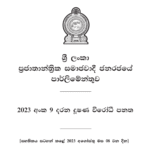The case revolves around an appeal by David Michael Joachim, who contested his employment termination by Aitken Spence Travels Ltd. This termination was the result of alleged misconduct, particularly regarding a dispute with his manager, Shane De Silva. The central issue was whether Joachim’s behavior, involving abusive language and insubordination, justified termination or if compensation was warranted despite the dismissal.
Case Summary and Background:
- Employment and Incident: Joachim, who joined Aitken Spence Travels Ltd. in 1990 and was promoted to Senior Executive by 1996, was involved in a dispute with his manager over incomplete documentation related to the company’s ticketing operations. Joachim submitted a voucher to De Silva without entering details in the required “Exchange Order Book,” prompting De Silva to reject the documentation and issue corrective instructions.
- Insubordination Allegations: In response to De Silva’s feedback, Joachim allegedly used offensive language, claiming he would act as he saw fit. This escalated into a formal complaint by De Silva, and Joachim was subsequently found guilty of three charges: defying his manager’s instructions, using obscene language, and undermining managerial authority.
- Termination: A domestic inquiry found Joachim guilty, leading to his dismissal on November 3, 2000. Joachim challenged this dismissal before the Labour Tribunal, which upheld the termination as justified. His appeal to the Provincial High Court was dismissed, leading him to further appeal to the Supreme Court.
Legal Questions and Rulings:
The Supreme Court reviewed key questions, particularly whether:
- The lower courts erred in evaluating evidence regarding Joachim’s use of obscene language.
- Compensation could be considered even if the termination was deemed justified.
- Evidence Evaluation: The Supreme Court found no error in the Labour Tribunal’s judgment that Joachim’s conduct, including his aggressive language toward his manager, constituted insubordination. The court emphasized that the abusive language, even if commonplace, was inappropriate in a professional setting and warranted disciplinary action.
- Proportionality of Termination: The Supreme Court examined if the termination was proportional to the offense. It affirmed that the dismissal was justified based on repeated misconduct by Joachim, which his superiors had previously addressed without improvement in his behavior.
- Compensation Issue: Joachim’s counsel argued for compensation based on his years of service. The Supreme Court, referencing precedents, held that compensation is typically granted in cases where the termination results from business restructuring or external reasons, not due to an employee’s misconduct. Since Joachim’s dismissal was disciplinary, no compensation was warranted.
Conclusion: The Supreme Court upheld Joachim’s dismissal without awarding compensation, reinforcing that abusive language and insubordination in the workplace justify termination. The ruling underscored that disciplinary terminations, as opposed to layoffs due to business decisions, do not merit compensation.
This judgment highlights the importance of maintaining professional conduct and the court’s stance on upholding managerial authority, especially when disciplinary actions are necessary to preserve workplace order.
Read Full Judgement














